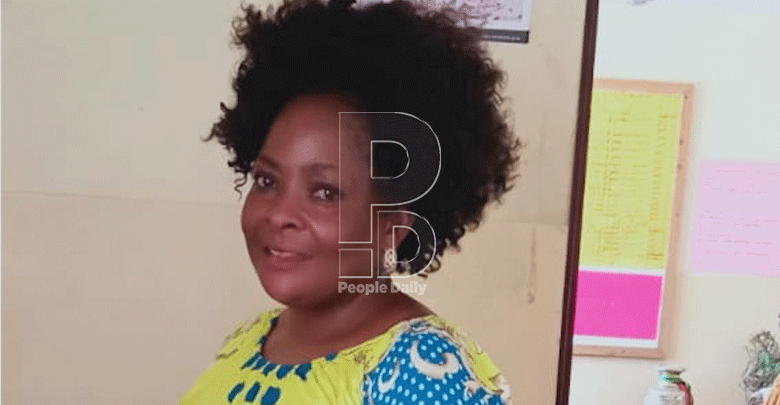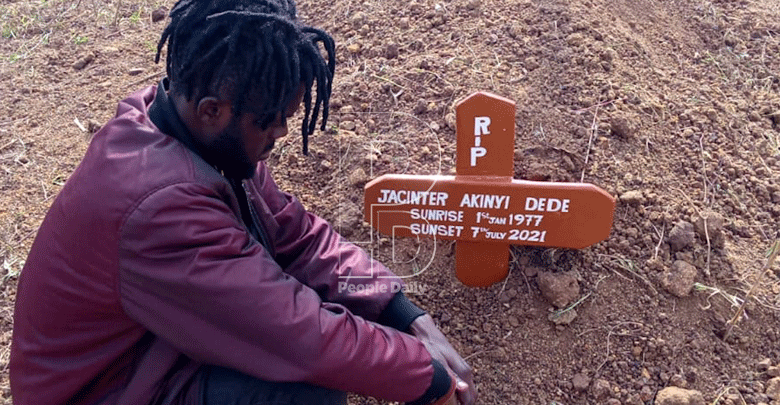Covid-19 complicates loved ones’ health, death
By Ann Wairimu, August 3, 2021Ann Wairimu @ann_wairimo
It’s been three weeks since rapper Omar Omondi, better known as Ohms Law Montana lost his mother Jacinter Akinyi Dede. He misses everything about her.
“I miss her voice, her food, her stories, her smile. She loved music and would try to rap like me… I miss her counsel. I miss her being there for me. I miss her attending my shows… In short, I miss everything about her,” he says.
Montana, a firstborn of four boys, describes his mother as a fighter. Though she separated from his dad 16 years ago, she made sure that Montana and his siblings never lacked. Especially, she was passionate about education and made sure her children got the best she could afford.
He shares how his mother’s death has impacted his music career. “Right now, it’s hard to write.
Each time I think of writing a song, I just want to write about my mother. Considering that I’m working on my album, this has slowed down the pace,” reveals the award-winning Mombasa-based artiste.
The 28-year-old recalls how his mother had been struggling with high blood pressure for a while in the months prior to her demise and how she had been in and out of hospital.
“Three days before she passed on, she had an X-ray done that indicated that her lungs were compromised.
Her oxygen levels were also low. When her X-ray reports came out, we were advised to take her to “corona tent” at the Coast General Hospital.
The doctor at the tent took a look at her X-ray report and concluded that she had Covid-19 and they had to isolate her.
They found her a bed and admitted her on July 4, this year at 11pm.

She was put on a ventilator machine. Sadly, she passed on on July 7 at around 1pm, aged 44 years,” Montana recalls.
Lab testing for Covid-19 has increased greatly since the virus spread across the globe.
However, according to Dr James Awiti, a doctor at a Nairobi hospital, a chest CT scan or X-ray cannot accurately distinguish betweeen Covid-19 and other respiratory infections, such as flu.
“Unlike swab tests, which lead to specific diagnoses of Covid-19, imaging findings are not specific enough to confirm Covid-19. They can only point to signs of an infection.
Those signs could be due to other causes, including seasonal flu, which is very common at certain times of year,” he explains.
Hence CTs and X-rays should not be used as a first-line tool to diagnose or screen for Covid-19.
Hurried burial
No words can describe Montana’s feeling when he received the news that his mum had breathed her last.
It was shocking, especially because they were not sure if she had actually contracted Covid -19.
The fact that she was treated as a Covid-19 case made things even worse. The hospital gave the family 72 hours to bury their dead.
That the burial was to take place in their rural home in Migori county, which is marked as a Covid-19 hotspot, further complicated things.
Death in the Luo community affects the entire community and the relatives of the deceased come from afar to attend this event that provides that every Luo should be buried in the Luo ground.
The mourners weep, sing and dance to chase away the spirits of death that have taken their loved one.
“I am a Luo and we have an elaborate set of traditions and rituals that have to be performed.
The hospital gave us 72 hours to bury my mum. This made it difficult, considering our culture and the financial situation right now.
My father couldn’t travel to Mombasa because someone had to handle the arrangements in Migori where my mum was to be buried.
The most important tradition is the overnight stay of the body at the homestead. This was not possible due to the restrictions we had been given. We had to bury her immediately we arrived from Mombasa on July 11.
Also, Migori is a Covid-19 hotspot, so the usual meetings and culture practices could not really take place. It was extremely difficult for me, but I had the support of my mum’s sisters, my immediate family, friends, fellow artistes and fans, which made it easier to cope… through their prayers, words of comfort and financial assistance,” Montana explains.
Beatrice Nderitu, a sociologist, says though treating those people who show symptoms of Covid-19 as if they have the virus may be a precautionary measure, it may have a negative feeling.
She says how when talking about coronavirus disease, certain words and language such as ‘corona tent’ and isolation can perpetuate existing negative stereotypes or assumptions, strengthen false associations between the disease and other factors, create widespread fear, or dehumanise those who have the disease.
This can drive people away from getting screened, tested and quarantined.
Positive approach
“We recommend a ‘people first’ language that respects and empowers people.
Failure to this has the potential to influence how people suspected to have Covid-19, patients and their families and affected communities are perceived and treated,” she adds.
Nderitu says coronavirus is much more than a health crisis as it affects all spheres of life be it social and economic, and moreso has the potential to trigger actions that violate human rights.
“This can result in more severe health problems and difficulties controlling a disease outbreak.
It can drive people to hide the illness to avoid discrimination, prevent people from seeking health care immediately and discourage them from adopting healthy behaviour,” she explains.
Montana concurs: “I know Covid-19 is real, but how those who are suspected to have the virus and their families are treated is wanting,” he says in conclusion.
